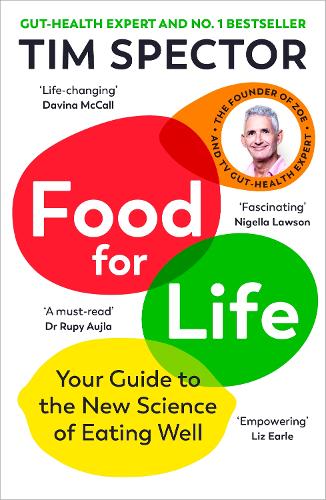
Food for Life: The New Science of Eating Well, by the #1 bestselling author of SPOON-FED
(Paperback)
Available Formats
Hardback
Published: 27th October 2022
Paperback
Published: 15th November 2022
Paperback
Published: 9th January 2024
Publishing Details
Food for Life: The New Science of Eating Well, by the #1 bestselling author of SPOON-FED
By (Author) Tim Spector
Vintage Publishing
Vintage
9th January 2024
4th January 2024
United Kingdom
Classifications
General
Non Fiction
Cookery for specific diets and conditions
Popular science
Cultural studies: food and society
Agriculture, agribusiness and food production industries
Conservation of the environment
Coping with / advice about allergies, including food allergies
613.2
Physical Properties
Paperback
528
Width 128mm, Height 198mm, Spine 22mm
360g
Description
A comprehensive guide to the new science of nutrition, drawing on Tim Spector's cutting-edge research. Food is our greatest ally for good health, but the question of what to eat in the age of ultra-processed food has never seemed so complicated. Bestselling author and scientist Tim Spector has the answers in this definitive, easy-to-follow guide to the new science of eating well. Tim Spector has pioneered a new approach to nutrition, encouraging us to forget misleading calorie counts and nutritional breakdowns. In Food for Life he draws on over a decade of cutting-edge scientific research, along with his own personal insights, to deliver a new and comprehensive approach to what we should all know about food today. Empowering and practical, Food for Life is nothing less than a new approach to how to eat - for our health and the health of the planet.
Author Bio
Tim Spector is a professor of genetic epidemiology at King's College London and honorary consultant physician at Guy's and St Thomas' Hospitals. He is a multi-award-winning expert in personalised medicine and the gut microbiome, and the author of four books, including the bestselling The Diet Myth. He appears regularly on TV and radio around the world, and has written for the Guardian, BMJ, and many other publications. He is the lead researcher behind the world's biggest citizen science health project, the COVID Symptom Study app. This free tool has been used by nearly 4 million people in the UK, US and Sweden to diagnose themselves without testing. It has confirmed new symptoms and risk factors for the virus, allowing scientists to monitor its progress and warn health authorities.
